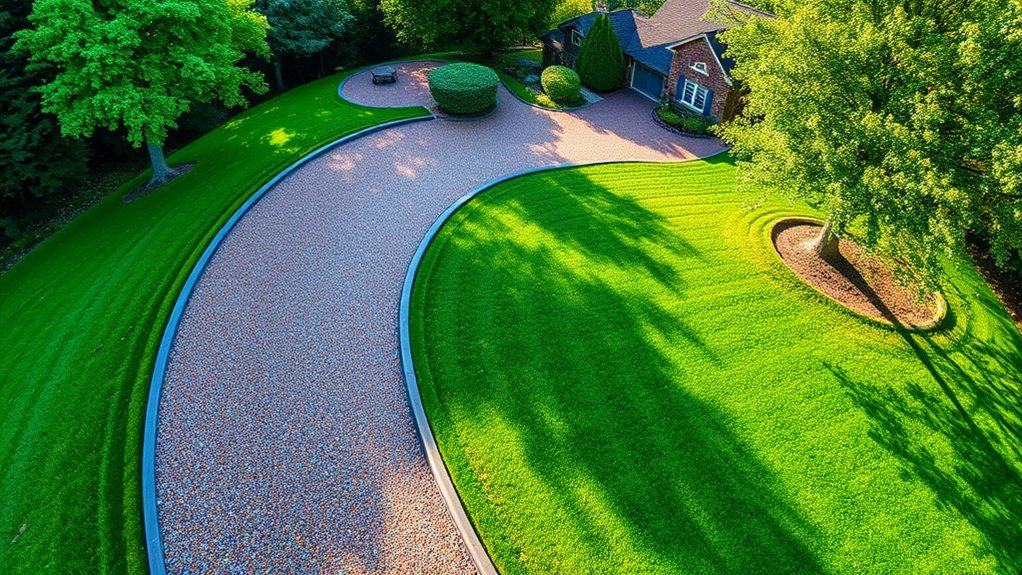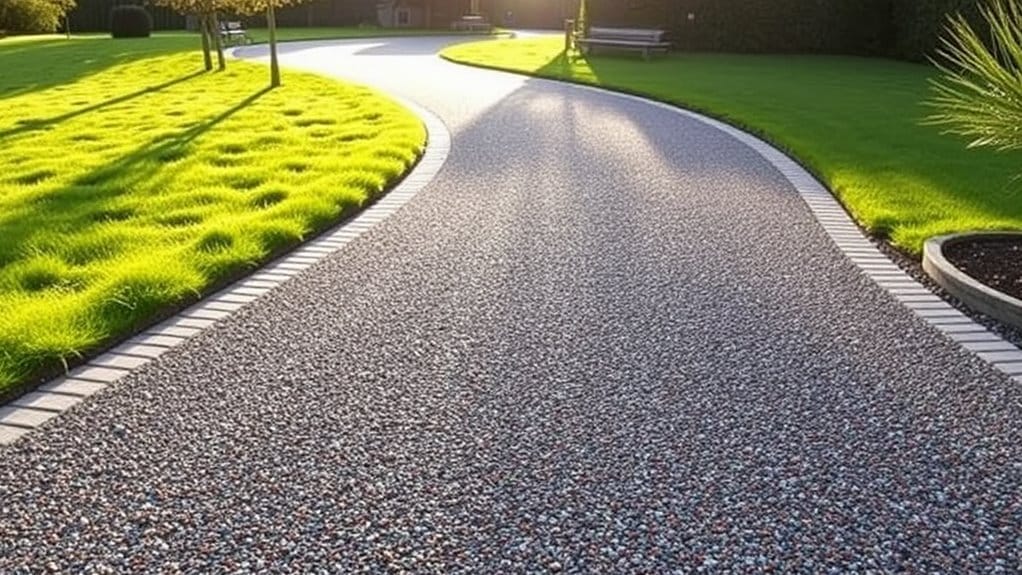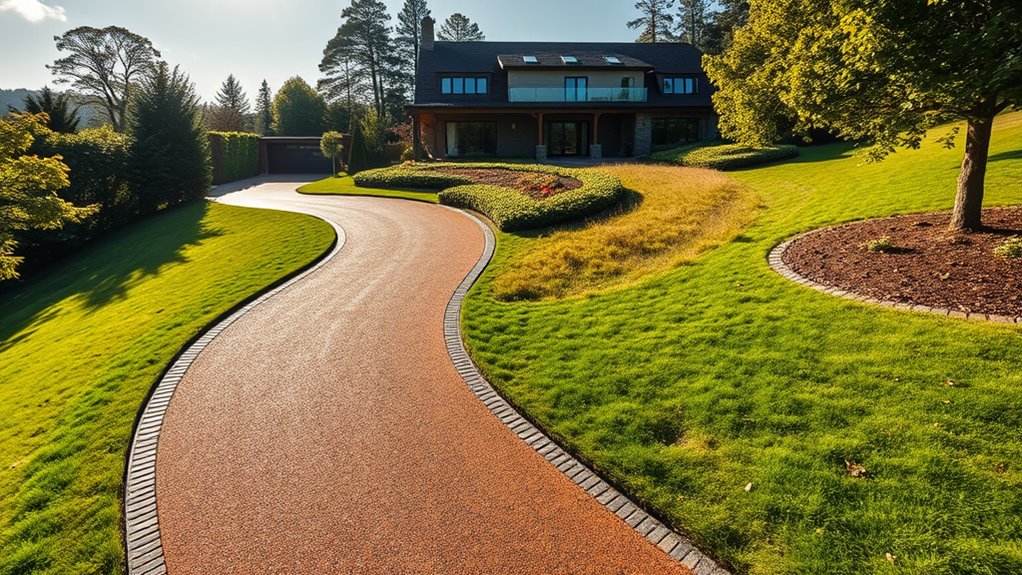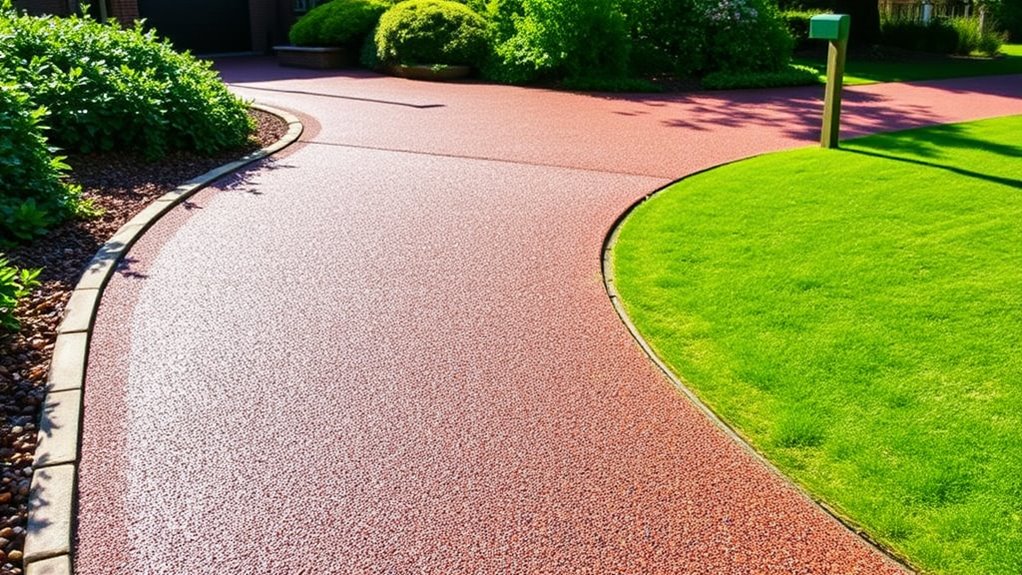Resin bound driveways work brilliantly for sloping properties, offering both strength and kerb appeal. Check your slope gradient first – you'll need at least 18mm depth for a proper, lasting finish. Sound groundwork and proper drainage are essential to prevent water pooling. These surfaces cope well with British weather, offering good grip in the rain and standing up to UV rays. They're also permeable, helping manage our frequent downpours. Dead easy to maintain, they'll last 15-25 years and boost your property value. Available in loads of colours to match your home's style, from Yorkshire stone to Cotswold buff. Perfect for steep drives where tarmac might not cut it.
Key Takeaways
Proper Assessment
Check your driveway's gradient before starting – anything too steep risks water damage and surface wear. A gentle slope is ideal for resin-bound surfaces.
Thickness Matters
Your resin layer needs at least 18mm depth on slopes – skimp on this, and you'll face problems later. Think of it as building a proper foundation for a house.
Ground Prep
Sort the base layer first. Just like you wouldn't build on sand, your resin surface needs solid groundwork to prevent future dips and cracks.
Smart Drainage
Water's your biggest challenge on slopes. Proper drainage channels and soakaways are essential – they'll save you from puddles and potential flooding.
Get the Experts
Don't DIY this one. Professional installers understand British weather conditions and building regulations. They'll ensure your sloped driveway meets all UK standards and lasts for years.
Key Characteristics of Resin Bound Driveways
Resin bound driveways offer a practical and stylish solution for sloping properties. The system combines stone or glass aggregates with clear resin, creating a hard-wearing surface that's both durable and visually striking. The range of colours available means you can match your driveway to your property's style, from traditional greys and browns to bolder contemporary shades. Quality installations use UV-stable resins to prevent colour fading, whilst the seamless finish looks neat and tidy, with the added benefit of deterring weeds and providing good grip in wet weather. A key advantage is the permeable surface, which allows rainwater to drain through naturally, preventing puddles and meeting SUDS regulations – particularly important for UK weather conditions. The surface requires little upkeep beyond occasional sweeping and can handle daily vehicle use without deteriorating. For sloping driveways, the non-slip properties and excellent drainage make resin bound surfaces a sensible choice that combines practicality with kerb appeal. Additionally, the durability and weather-resistance of resin bound surfaces ensures they can withstand the rigors of changing weather conditions over time, making it essential to invest in high-quality materials for optimal durability. Installation by qualified professionals ensures a finish that will last for years whilst maintaining its smart appearance.
Installation Considerations for Sloping Areas

Installing resin bound driveways on sloping properties demands proper planning and expertise to ensure a durable finish. The first crucial step involves a thorough slope assessment – checking that the gradient isn't excessive and ensuring proper ground preparation. Additionally, the depth of the resin layer should be a minimum of 18mm for durability, which is crucial for avoiding structural vulnerabilities.
| Key Consideration | Description | Importance |
|---|---|---|
| Ground Preparation | Level and compact the ground for a solid foundation | Prevents future movement and settling |
| Drainage Solutions | Install proper drainage channels | Stops water build-up and surface damage |
| Gradient-Specific Resin | Select resins meant for sloped surfaces | Ensures lasting stability |
| Textured Finish | Add grip-enhancing texture | Essential for safety, particularly in British weather |
| Professional Help | Use qualified contractors | Guarantees proper installation to UK standards |
The success of a sloped resin driveway often comes down to proper groundwork. Think of it like building a house – without solid foundations, even the best materials won't perform properly. A professionally installed system should last 15-20 years when done correctly. Additionally, the porous structure of resin driveways helps to effectively manage drainage, further enhancing their performance on sloped terrain.
Advantages of Resin Driveways

Resin driveways pack plenty of benefits, from lasting durability to striking kerb appeal. When properly installed and maintained, they serve 15-25 years – significantly longer than traditional surfaces.
Unlike tarmac, resin stands up to cracking and doesn't develop potholes, making it brilliant for British weather. Its porous structure prevents puddles and ice patches whilst managing rainwater runoff – ticking boxes for sustainable drainage requirements. This is because resin bound driveways are porous**, allowing water drainage effectively without needing supplementary systems.
The smart appearance of resin driveways boosts property value. Think smooth, uniform finish in countless colour options and textures to match any house style.
What's more, they keep their good looks, fighting off UV damage and stopping weeds in their tracks – meaning less weekend maintenance for you.
Resin works particularly well on sloping drives, channelling rainwater efficiently without pooling.
Factor in the minimal upkeep needed, and these driveways prove cost-effective over time. For homeowners wanting an attractive, hardy and eco-friendly driveway solution, resin ticks all the boxes.
Types of Resin Driveways Explained

Choosing Between Resin Driveways
Two main types of resin driveways exist: resin bound and resin bonded.
Resin bound combines stones with clear resin to create a smooth, water-permeable surface. It meets UK drainage regulations (SUDS) and typically lasts 15-25 years. Installation needs professional expertise and a proper foundation. Costs sit between £50-£80 per square metre for polyurethane resin – worth considering for its UV resistance and flexibility.
Resin bonded is simpler: resin goes straight onto the surface with stone scattered on top. It's cheaper at £30-£60 per square metre using epoxy resin but lasts just 5-15 years. Think of it like adding a grippy coat to your driveway – effective but less durable.
Your choice boils down to three factors: budget, looks and longevity. It's important to note that resin bound surfaces offer aesthetic appeal with extensive design options, while resin bonded options cater well to immediate budget constraints.
Resin bound suits those after a premium, long-lasting finish, whilst resin bonded works well for tighter budgets where immediate kerb appeal matters more than longevity.
Maintenance and Safety Features

Maintaining Your Resin Driveway
A well-maintained resin driveway offers lasting durability and safety. Regular upkeep ensures your investment stands the test of time whilst meeting essential safety requirements.
| Maintenance Features | Safety Features |
|---|---|
| Regular cleaning prevents muck build-up and extends life | Anti-slip surface reduces accidents, particularly in British weather |
| Periodic sealing blocks weeds and moss growth | Proper drainage prevents flooding and soil erosion |
| UV-resistant materials keep colour fresh | Strong, flexible surface withstands daily vehicle use |
Your driveway needs routine cleaning with a garden hose or pressure washer on a gentle setting. A fresh seal coat every few years protects against Britain's damp climate, whilst regular checks catch issues before they worsen. The non-slip finish provides sure footing in wet weather, and the porous surface handles heavy rainfall effectively, preventing puddles and water damage. It is also important to engage certified experts for professional maintenance to address specific environmental conditions and enhance longevity.
Think of maintenance like caring for your car – regular attention prevents costly repairs and keeps everything running smoothly. For best results, tackle small issues promptly and follow manufacturer guidelines for cleaning products.
Frequently Asked Questions
How Long Does a Resin Bound Driveway Last?
A properly installed resin bound driveway lasts between 15 to 25 years with proper care. Regular sweeping, gentle pressure washing and prompt removal of oil or fuel spills help maintain the surface. Much like caring for a stone patio, avoiding harsh chemicals and winter salt will protect your investment and keep the driveway looking fresh for decades.
Can Resin Driveways Be Installed in Winter?
Yes, resin driveways can be installed during winter in the UK, though extra care is needed. The cold British weather means longer curing times, and installers must carefully manage temperature and moisture levels. Professional contractors will use weather-appropriate resin mixtures and may need to set up temporary shelters to protect against rain and frost. Whilst summer remains ideal for installation, winter projects are perfectly feasible with proper planning and expertise.
Are There Color Options for Resin Bound Driveways?
Resin bound driveways offer a wide range of colour choices. You'll find everything from natural stone shades like warm honey and grey slate to bolder options such as terracotta and deep bronze. Many UK homeowners opt for neutral tones that complement their brickwork, whilst others choose multi-toned blends to create distinctive patterns. The colour won't fade over time, making it a practical choice for British weather conditions.
Is Planning Permission Needed for Resin Driveways?
Planning permission isn't typically required for resin driveways in the UK, provided two key conditions are met: the surface must be permeable (allowing water to drain naturally), and the materials must comply with Sustainable Urban Drainage Systems (SUDS) regulations. However, if you live in a listed building or conservation area, it's worth checking with your local council first. This straightforward approach helps prevent surface water flooding and meets British building standards.
How Do Resin Driveways Compare to Block Paving?
Resin driveways and block paving each offer distinct benefits for UK homeowners. Resin surfaces deliver a modern, smooth finish that's highly customisable – think everything from earthy browns to contemporary greys. They need little maintenance beyond occasional sweeping and pressure washing. Block paving, whilst requiring more upkeep with regular weeding and potential re-sanding, allows for traditional patterns like herringbone or basketweave, adding character to your property's frontage.
Conclusion
In short, resin bound driveways work brilliantly on sloped properties, offering both kerb appeal and practical benefits. These surfaces last notably longer than traditional tarmac or concrete, with most installations maintaining their quality for 15-20 years with minimal upkeep. Perfect for British weather, they're slip-resistant, drain well and won't crack or shift on slopes – a particular concern for UK homeowners dealing with our varied climate. Whilst the initial cost may be higher than standard surfaces, the long-term value and reduced maintenance make it a sound investment for sloped driveways.
